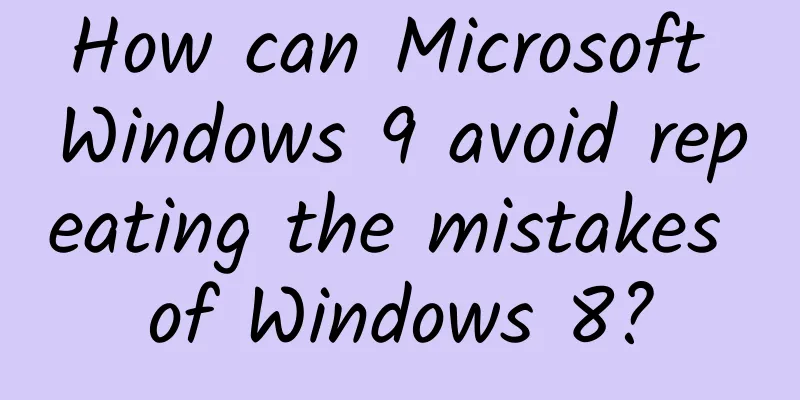How can Microsoft Windows 9 avoid repeating the mistakes of Windows 8?

|
It is said that Microsoft will release the latest Windows 9 "Technical Preview" version at the end of this month, so that developers and users can give feedback on the changes of Windows 9 at any time. Given that this is the most important system release since Nadella became Microsoft CEO, and Microsoft is facing a critical moment of transformation, the appearance of Windows 9 has attracted much attention in the industry. As we all know, due to the weakness of the traditional PC industry and the rapid development of mobile Internet (smartphones and tablets), Microsoft's traditional Windows is gradually declining. For this reason, Ballmer released the so-called Windows 8 system that integrates traditional PCs and mobile devices during his tenure. Unfortunately, due to this unconventional integration, it over-relies on mobile devices in terms of usage and experience, which leads to confusion in the choice and experience of traditional PC users. As a result, it neither boosted Microsoft's performance in the PC market as expected, nor did it allow Microsoft to make big gains in the mobile market. So-called lessons from the past. So how will the upcoming Windows 9 avoid repeating the mistakes of Windows 8? First of all, we believe that even though Nadella has repeatedly emphasized Microsoft's one Windows strategy, judging from the current industry and Microsoft's entire market (traditional PC and mobile) trends and performance, Microsoft's Windows 9 should still focus on the experience of traditional PC users, at least focusing on traditional PC users. Some people may say that the traditional PC industry is declining and mobile is the future. But market facts have proved that the traditional PC industry is bottoming out after a sharp decline, as evidenced by the fact that the overall PC market decline has greatly reduced last quarter, four of the top five traditional PC manufacturers have achieved year-on-year growth, and Intel, which mainly produces PC chips, has seen an increase in performance. More importantly, the past experience and lessons of Windows 8 have proved that relying on mobile experience has not only failed to change Microsoft's position in the mobile market, but has offended traditional PC users. As the saying goes, you lose the watermelon and pick up the sesame seeds, but for Microsoft, it is more like losing the watermelon and not picking up the sesame seeds. In addition, from the perspective of technology and ecosystem, there is still no company that can balance the traditional PC and mobile user experience. The industry knows that there have been constant rumors about the integration of Apple iOS and Mac X and Google Android and Chrome OS, but to this day, Apple and Google are still independently developing and updating these two operating systems for the traditional PC and mobile markets respectively. At best, they are cautiously trying to migrate a very small number of applications in the mobile ecosystem to the traditional PC platform, which is actually a test of the waters. For example, recently Google ported the first four Android apps to Chromebooks based on the Chrome OS system - Vine, Evernote, Duolingo and Sight Words. Porting Android apps to Chromebooks is part of a plan announced by Google at the I/O developer conference in June, with the goal of eliminating the barriers between Android and Chromebooks. Currently, because Google controls the porting platform App Runtime for Chrome, app developers cannot directly port Android apps to Chromebooks. What's important is that Google only allows properly optimized Android apps to run on Chrome OS. From this, it can be seen that the so-called true integration is not only the operating system itself, but the integration of two different ecosystems. It is worth mentioning that even in the same market, Google recently released the Android One system for the low-end smartphone market in addition to the mainstream Android system. It can be seen that even in the same market, user needs and experiences will be different, and even such differences still need different systems to support them. Based on the above actual market demand and technical background, combined with Microsoft's performance in the traditional PC and mobile markets, we believe that Microsoft Windows 9 should avoid repeating the mistakes of Windows 8 and return to the user experience of traditional PCs. Don't expect this version of Windows to realize its own Windows strategy. After all, integration is not only achieved by independent operating systems or changing all names to Windows, it is the integration of two completely different operating system-based ecosystems. Microsoft must make this clear. As a winner of Toutiao's Qingyun Plan and Baijiahao's Bai+ Plan, the 2019 Baidu Digital Author of the Year, the Baijiahao's Most Popular Author in the Technology Field, the 2019 Sogou Technology and Culture Author, and the 2021 Baijiahao Quarterly Influential Creator, he has won many awards, including the 2013 Sohu Best Industry Media Person, the 2015 China New Media Entrepreneurship Competition Beijing Third Place, the 2015 Guangmang Experience Award, the 2015 China New Media Entrepreneurship Competition Finals Third Place, and the 2018 Baidu Dynamic Annual Powerful Celebrity. |
>>: Eight reasons why WeChat e-commerce doesn’t work
Recommend
Five operational frameworks for private domain traffic!
At this stage, for e-commerce bosses, acquiring c...
After the new regulations of TikTok, here are the secrets to double the traffic of new accounts on dou+!
Recently, Douyin released an important announceme...
I have been deceived by black sesame pills for too long! What is the real secret to growing long hair?
Recently, #Eating too many black sesame pills may...
What are the functions of the Foshan Campus Errands Mini Program? How much does it cost to create an errand running app?
Some time ago, a student came to us and said that ...
The most difficult 618 sales data grew by 100% against the trend, TCL created the best combination of high-end products
The repeated epidemics, obstructed logistics, the...
Mid-Autumn Festival mooncake money-making project, how profitable is selling mooncakes?
The Mid-Autumn Festival coincides with the Nation...
Is it technically difficult to change WeChat ID? Why has WeChat only allowed changing WeChat ID now?
WeChat has been around for nearly 10 years since ...
How to use the media to create internet celebrity products?
Every company wants to build its own internet cel...
Review of marketing cases in Q1 2022!
In a blink of an eye, three months have passed in...
Apple releases iOS / iPadOS 17 third public beta
August 10 news, Apple today invites non-developer...
[Diao Chan's Stock Market Discussion] The 5th Diao Chan Band Training Camp
[Diao Chan's Stock Market Discussion] The 5th...
How much does it cost to develop the Haixi points mini program? What is the price for developing the Haixi points mini program?
The launch of mini programs has brought convenien...
Information flow promotion, analysis of 7 excellent case techniques!
For third-party optimizers, advertising placement...






![C4D+Octane+PS [E-commerce product required course teaching collection]](/upload/images/67cc0c4b86c2c.webp)


